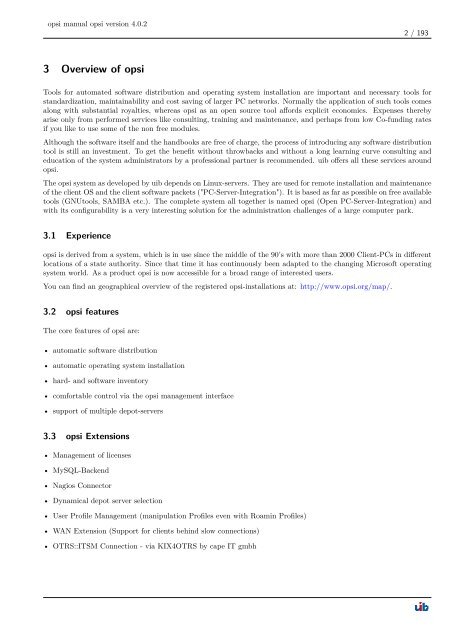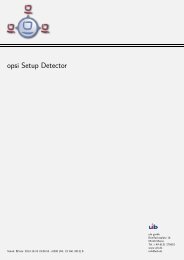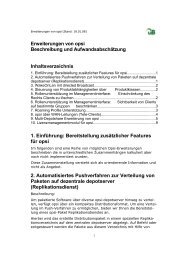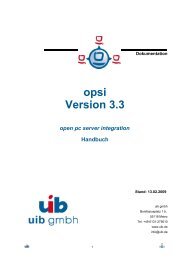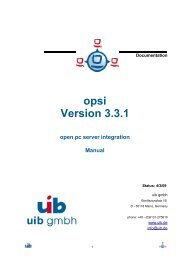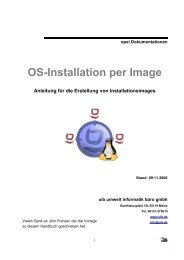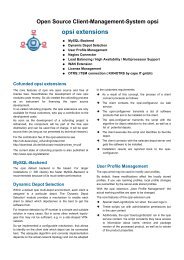opsi manual opsi version 4.0.2 - opsi Download - uib
opsi manual opsi version 4.0.2 - opsi Download - uib
opsi manual opsi version 4.0.2 - opsi Download - uib
Create successful ePaper yourself
Turn your PDF publications into a flip-book with our unique Google optimized e-Paper software.
<strong>opsi</strong> <strong>manual</strong> <strong>opsi</strong> <strong>version</strong> <strong>4.0.2</strong><br />
3 Overview of <strong>opsi</strong><br />
2 / 193<br />
Tools for automated software distribution and operating system installation are important and necessary tools for<br />
standardization, maintainability and cost saving of larger PC networks. Normally the application of such tools comes<br />
along with substantial royalties, whereas <strong>opsi</strong> as an open source tool affords explicit economics. Expenses thereby<br />
arise only from performed services like consulting, training and maintenance, and perhaps from low Co-funding rates<br />
if you like to use some of the non free modules.<br />
Although the software itself and the handbooks are free of charge, the process of introducing any software distribution<br />
tool is still an investment. To get the benefit without throwbacks and without a long learning curve consulting and<br />
education of the system administrators by a professional partner is recommended. <strong>uib</strong> offers all these services around<br />
<strong>opsi</strong>.<br />
The <strong>opsi</strong> system as developed by <strong>uib</strong> depends on Linux-servers. They are used for remote installation and maintenance<br />
of the client OS and the client software packets ("PC-Server-Integration"). It is based as far as possible on free available<br />
tools (GNUtools, SAMBA etc.). The complete system all together is named <strong>opsi</strong> (Open PC-Server-Integration) and<br />
with its configurability is a very interesting solution for the administration challenges of a large computer park.<br />
3.1 Experience<br />
<strong>opsi</strong> is derived from a system, which is in use since the middle of the 90’s with more than 2000 Client-PCs in different<br />
locations of a state authority. Since that time it has continuously been adapted to the changing Microsoft operating<br />
system world. As a product <strong>opsi</strong> is now accessible for a broad range of interested users.<br />
You can find an geographical overview of the registered <strong>opsi</strong>-installations at: http://www.<strong>opsi</strong>.org/map/.<br />
3.2 <strong>opsi</strong> features<br />
The core features of <strong>opsi</strong> are:<br />
• automatic software distribution<br />
• automatic operating system installation<br />
• hard- and software inventory<br />
• comfortable control via the <strong>opsi</strong> management interface<br />
• support of multiple depot-servers<br />
3.3 <strong>opsi</strong> Extensions<br />
• Management of licenses<br />
• MySQL-Backend<br />
• Nagios Connector<br />
• Dynamical depot server selection<br />
• User Profile Management (manipulation Profiles even with Roamin Profiles)<br />
• WAN Extension (Support for clients behind slow connections)<br />
• OTRS::ITSM Connection - via KIX4OTRS by cape IT gmbh


